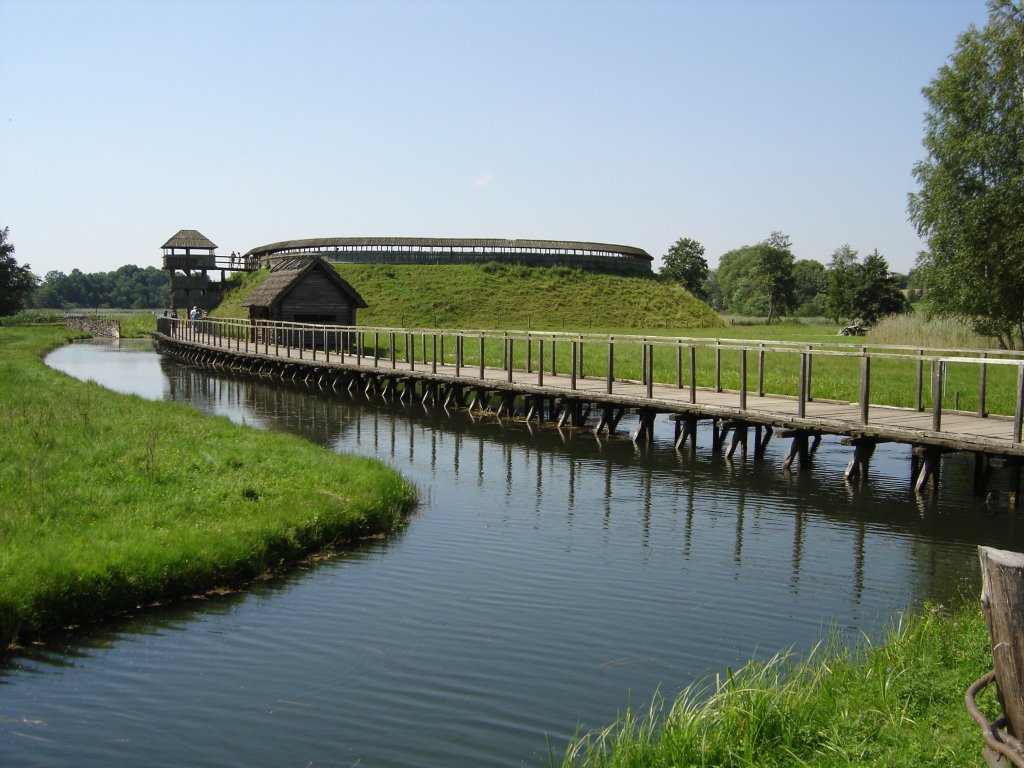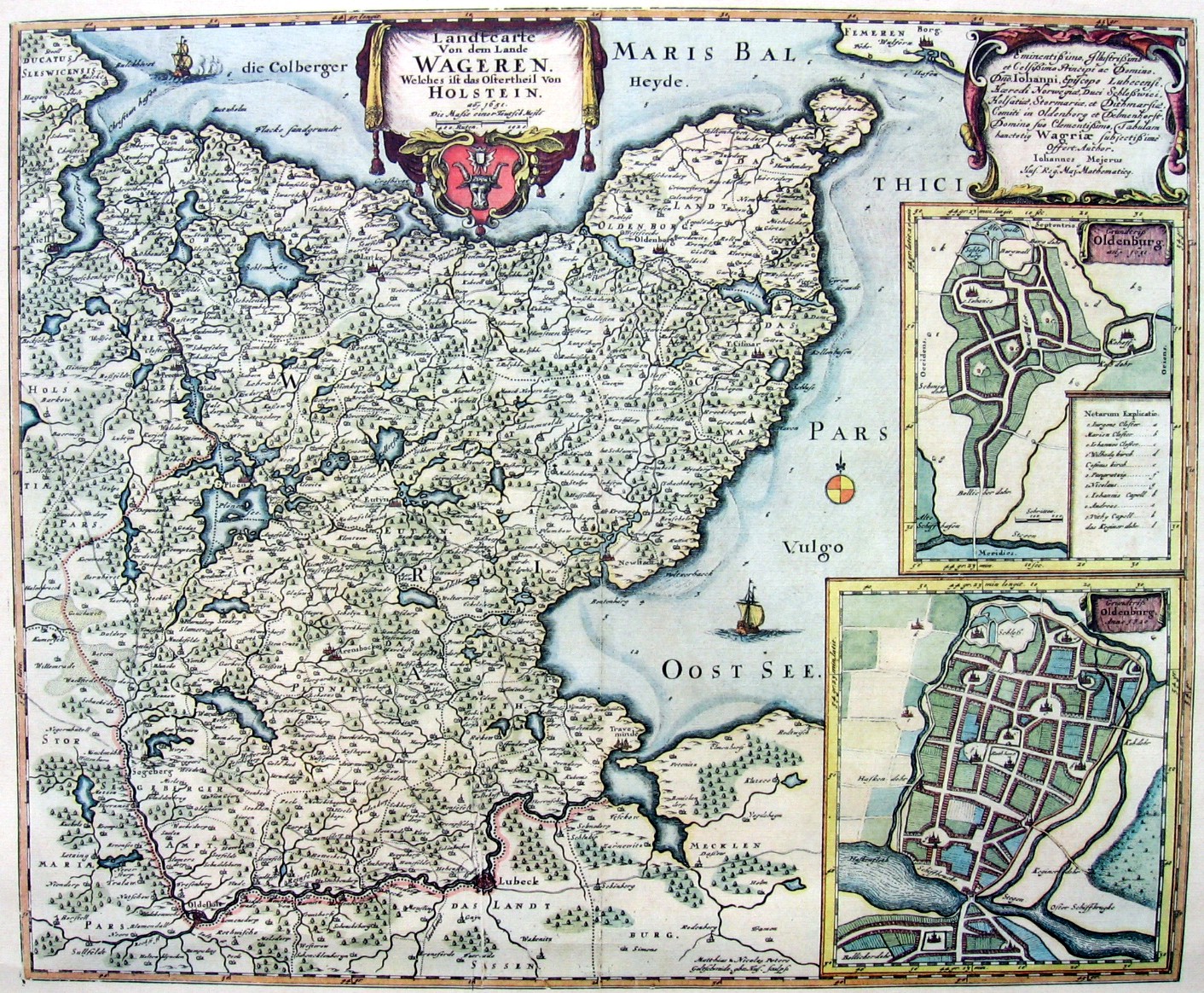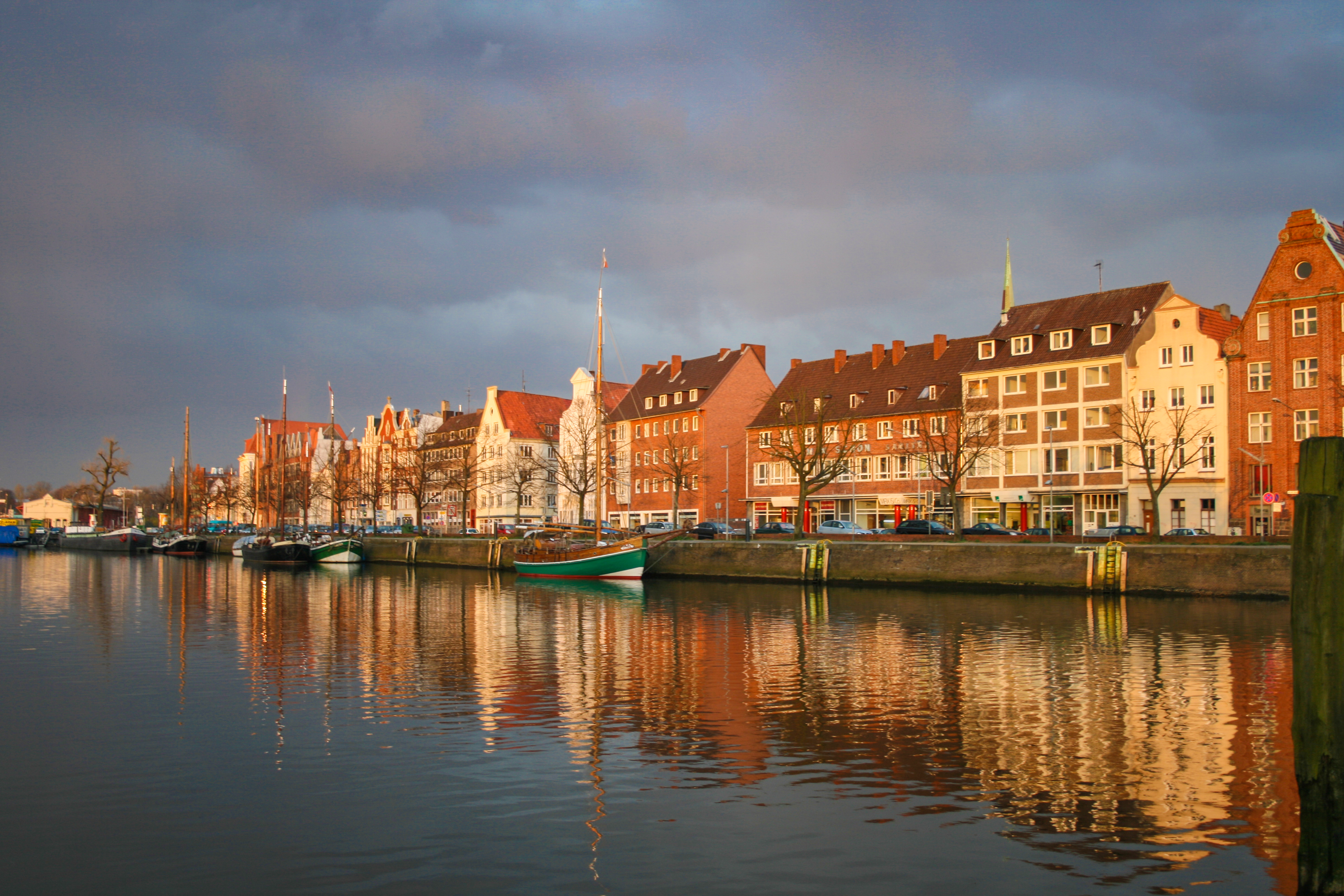|
Liubice
Liubice, also known by the German name Alt-Lübeck ("Old Lübeck"), was a medieval West Slavic settlement near the site of modern Lübeck, Germany. Liubice was located at the confluence of the Schwartau with the Trave across from Teerhof Island, approximately four kilometres north of Lübeck's island old town. The residence of Henry, the Christian prince of the Obotrites, Liubice was destroyed after his death by the pagan Rani of Rugia. History Slavic tribes began migrating to the Bay of Lübeck in the 7th century, replacing migrating Germanic tribes. The Wagrians and Polabians established numerous villages and castles, including Starigard, Plune, Racisburg, and Liubice, whose name means "lovely". Liubice was sparsely populated during the 9th and 10th centuries. In the middle of the 11th century, the settlement began to develop. Starting in 1055 during the rule of Gottschalk, a Christian prince of the Obotrite confederacy, the old castle was rebuilt. Gottschalk was kille ... [...More Info...] [...Related Items...] OR: [Wikipedia] [Google] [Baidu] |
Henry (Obotrite Prince)
Henry (before 1066 – 22 March or 7 June 1127) was an Obotrite prince or king (1093–1127) from the Nakonid dynasty; he was regarded by contemporaries as "King of the Slavs" (''rex Slavorum'').Herrmann, p. 316 The Obotrite realm reached its greatest area during Henry's rule, extending from the Elbe to the Oder and from the Havelland to the Baltic Sea. Henry was the second son of the Obotrite prince Gottschalk, a Christian who was killed in a pagan uprising in 1066, and Sigrid Svendsdatter; Henry and his half-brother Budivoj were subsequently raised in Denmark and Lüneburg, respectively. The Obotrite lands passed to the leader of the uprising, the pagan Kruto. While Henry remained passive, the Saxon-supported Budivoj was killed by Kruto at Plön. Once Kruto reached old age, he was forced to defend against an invasion by Henry with Danish support in 1090. Kruto could not prevent Henry from harrying and plundering the Wagrian coastline. The pressured Kruto agreed to meet with Henr ... [...More Info...] [...Related Items...] OR: [Wikipedia] [Google] [Baidu] |
Lübeck
Lübeck (; Low German also ), officially the Hanseatic City of Lübeck (german: Hansestadt Lübeck), is a city in Northern Germany. With around 217,000 inhabitants, Lübeck is the second-largest city on the German Baltic coast and in the state of Schleswig-Holstein, after its capital of Kiel, and is the 35th-largest city in Germany. The city lies in Holstein, northeast of Hamburg, on the mouth of the River Trave, which flows into the Bay of Lübeck in the borough of Travemünde, and on the Trave's tributary Wakenitz. The city is part of the Hamburg Metropolitan Region, and is the southwesternmost city on the Baltic, as well as the closest point of access to the Baltic from Hamburg. The port of Lübeck is the second-largest German Baltic port after the port of Rostock. The city lies in the Northern Low Saxon dialect area of Low German. Lübeck is famous for having been the cradle and the ''de facto'' capital of the Hanseatic League. Its city centre is Germany's most extens ... [...More Info...] [...Related Items...] OR: [Wikipedia] [Google] [Baidu] |
Rani (Slavic Tribe)
The Rani or Rujani (german: Ranen, ''Rujanen'') were a West Slavic tribe based on the island of Rugia (Rügen) and the southwestern mainland across the Strelasund in what is today northeastern Germany. The Rani tribe emerged after the Slavic settlement of the region in the ninth century,Ole Harck, Christian Lübke, Zwischen Reric und Bornhöved: Die Beziehungen zwischen den Dänen und ihren slawischen Nachbarn vom 9. Bis ins 13. Jahrhundert: Beiträge einer internationalen Konferenz, Leipzig, 4.-6. Dezember 1997, Franz Steiner Verlag, 2001, p.15, and ranked among the most powerful of several small Slav tribes between the Elbe and lower Vistula rivers before the thirteenth century. They were among the last tribes to hold to Slavic paganism, and the influence of their religious center at Arkona reached far beyond their tribal borders. In 1168, the Rani were defeated by King Valdemar I of Denmark, and his adviser Absalon, Bishop of Roskilde, resulting in the conversion of ... [...More Info...] [...Related Items...] OR: [Wikipedia] [Google] [Baidu] |
Pribislav (Wagrian Prince)
Pribislav ( 1131–d. after 1156) was an Obotrite prince who ruled Wagria as "Lesser king" (''regulus'') and resided in Liubice, governing one half of the Obotrite lands, the other half being governed by Niklot. Life Pribislav was the son of Budivoj, and nephew of Henry. After the murder of Canute Lavard in 1131, the Obotrite lands were partitioned between Pribislav and Niklot, with the former receiving Wagria and Polabia and the latter Mecklenburg until the Peene River; Pribislav received the title ''regulus'', or lesser king and resided in Liubice. A follower of Slavic paganism, Pribislav was described by Emperor Lothair III, whom he was dependent upon, as an enemy of Christianity and an idolater. After the death of Lothair in 1137, Lothair's son-in-law Henry the Proud and Margrave Albert the Bear fought over the Duchy of Saxony. Pribislav took advantage of the struggle to rebel against the authority of the Holy Roman Empire by destroying the new castle of Segeberg and invading ... [...More Info...] [...Related Items...] OR: [Wikipedia] [Google] [Baidu] |
Polabian Slavs
Polabian Slavs ( dsb, Połobske słowjany, pl, Słowianie połabscy, cz, Polabští slované) is a collective term applied to a number of Lechitic ( West Slavic) tribes who lived scattered along the Elbe river in what is today eastern Germany. The approximate territory stretched from the Baltic Sea in the north, the Saale and the ''Limes Saxoniae''Christiansen, 18 in the west, the Ore Mountains and the Western Sudetes in the south, and Poland in the east. They have also been known as Elbe Slavs (german: Elbslawen) or Wends. Their name derives from the Slavic ''po'', meaning "by/next to/along", and the Slavic name for the ''Elbe'' (''Labe'' in Czech and ''Łaba'' in Polish). The Polabian Slavs started settling in the territory of modern Germany in the 6th century. They were largely conquered by Saxons and Danes since the 9th century and were subsequently included and gradually assimilated within the Holy Roman Empire. The tribes were gradually Germanized and assimilat ... [...More Info...] [...Related Items...] OR: [Wikipedia] [Google] [Baidu] |
Nakonid
The Nakonids were the leading noble family of the Slavic peoples of the Elbe River from ca. 960 until 1129. They were themselves of Obotrite origin and engineered the formation of a Slavic principality in the region. They became extinct in the male line in the early 12th century. Their capital was Mecklenburg Castle. The Nakonids derive their name — a modern invention — from the earliest attestable ruler of the dynasty, Nako, who fought the expansionist tendencies of the German kingdom in the mid and late 10th century before being defeated and converted to Christianity. The Nakonid leaders alternated between being lapsed Christians (''mali christiani'') and ardent missionaries of the Slavs who were the prime movers of the Germanisation and Christianisation of the Polabian Slavs. The German historian Heinz Stoob, in his retranslation of the chronicle of Helmold, derived the first genealogy of the Nakonids. Besides Helmold, Adam of Bremen, Thietmar of Merseburg, and S ... [...More Info...] [...Related Items...] OR: [Wikipedia] [Google] [Baidu] |
Wagria
WagriaArnold, Benjamin (1991). ''Princes and territories in medieval Germany'', Cambridge University Press, Cambridge and New York, p. 156. . (german: Wagrien, ''Waierland'' or ''Wagerland'') is the northeastern part of Holstein in the German state of Schleswig-Holstein, corresponding roughly to the districts of Plön and Ostholstein. The word "Wagria" is derived derived from the Slavic Lechites tribe of Wagri, which meant "those who live by the bays". Geography In the Middle Ages, and as still shown on early modern maps, Wagria was bordered on the north and east by the Baltic Sea from the Kiel Fjord to Lübeck Bay, and inland by the rivers Schwentine and Trave. Today, Wagria generally refers just to the Oldenburg Peninsula (''Oldenburgische Halbinsel'') in Ostholstein. The highest elevation in the peninsula is the Bungsberg at 168 metres. History The Lechitic (Slavic) root of the name, ''Wagria'', meant not only the so-called, present-day Wagrian peninsula, but the entir ... [...More Info...] [...Related Items...] OR: [Wikipedia] [Google] [Baidu] |
Trave
The Trave () is a river in Schleswig-Holstein, Germany. It is approximately long, running from its source near the village of Gießelrade in Ostholstein to Travemünde, where it flows into the Baltic Sea. It passes through Bad Segeberg, Bad Oldesloe, and Lübeck, where it is linked to the Elbe–Lübeck Canal. It is navigable for sea-going vessels from the Baltic to the Lübeck ports. The Herren Tunnel crosses the Trave, as do numerous bridges, and a ferry connects Travemünde with Priwall. Tributaries of the Trave include the Wakenitz and the Stepenitz. Course Source and upper Trave The Trave rises in Gießelrade (a village in Ostholstein), whence it flows first southwesterly through the Wardersee to Bad Segeberg and then further south to Bad Oldesloe. There it bends eastward to just south of Reinfeld, flowing past Hamberge and (a district of Lübeck) to reach Lübeck. In Lübeck The Elbe–Lübeck Canal joins the Trave from the south shortly before the river reaches Lüb ... [...More Info...] [...Related Items...] OR: [Wikipedia] [Google] [Baidu] |
Niklot
Niklot or Nyklot (1090 – August 1160) was a chief or prince of the Slavic Obotrites and an ancestor of the House of Mecklenburg. He became chief of the Obotrite confederacy, including the Kissini and the Circipani, between the years 1130 and 1131. He remained in this position until his death in 1160. At the same time he was Lord of (''Herr zu'') Schwerin, Quetzin and Malchow. For nearly 30 years he resisted Saxon princes, especially Henry the Lion during the Wendish Crusade. Resistance Niklot began his open resistance when the German King (later Emperor) Lothar III granted the Obotrite realm to his Danish vassal Canute Lavard. Together with Pribislav of Wagria, son of Budivoj and nephew of Henry, Niklot fought Lothar and Canute. After the murder of Canute in 1131, Niklot and Pribislav partitioned the Obotrite territory, with Niklot receiving the eastern lands. In order to weaken Pribislav in the following years, Niklot allied with Saxon lords, especially Count Adolf ... [...More Info...] [...Related Items...] OR: [Wikipedia] [Google] [Baidu] |
Canute Lavard
Canute Lavard ( Danish: Knud Lavard; cognate with English Lord) (12 March 1096 – 7 January 1131) was a Danish prince. Later he was the first Duke of Schleswig and the first border prince who was both a Danish and a German vassal, a position leading towards the historical double position of Southern Jutland. He was killed by his cousin Magnus (later King Magnus I of Sweden; ca. 1106–1134), who saw him as a rival to the Danish throne. Canute Lavard was canonized in 1170. He was an ancestor of the Valdemarian kings (''Valdemarerne'') and of their subsequent royal line. Canute Lavard was the father of King Valdemar I of Denmark (''Valdemar den Store'') and grandfather of King Valdemar II of Denmark (''Valdemar Sejr''). Biography Canute was the only legitimate son of King Eric I of Denmark (died 1103) and Boedil Thurgotsdatter, but as a minor he was bypassed in the election of 1104. He grew up in close contact with the noble family of Hvide, who were later on to be among hi ... [...More Info...] [...Related Items...] OR: [Wikipedia] [Google] [Baidu] |
Gottschalk (Obotrite Prince)
Saint Gottschalk (or Godescalc) ( la, Godescalcus) (died 7 June 1066) was a prince of the Obotrite confederacy from 1043 to 1066. He established a Slavic kingdom on the Elbe (in the area of present-day northeastern Germany) in the mid-11th century. His object in life seems to have been to collect the scattered tribes of the Slavs into one kingdom, and to make that kingdom Christian. "A pious and god-fearing man", Gottschalk effected the Christianisation of the Slavic tribes of the Elbe. He organised missions of German priests and founded monasteries at Oldenburg, Mecklenburg, Ratzeburg, Lübeck, and Lenzen, erecting the first three into dioceses. He himself often accompanied the missionaries on their work and augmented their message with his own explanations and instructions. In all this, he was supported by the efforts of Adalbert, Archbishop of Hamburg. However, the Obotrite nobility and peasantry largely remained pagan. Life Gottschalk's father Udo was a bad Christian (' ... [...More Info...] [...Related Items...] OR: [Wikipedia] [Google] [Baidu] |
Holstein
Holstein (; nds, label=Northern Low Saxon, Holsteen; da, Holsten; Latin and historical en, Holsatia, italic=yes) is the region between the rivers Elbe and Eider. It is the southern half of Schleswig-Holstein, the northernmost state of Germany. Holstein once existed as the German County of Holstein (german: Grafschaft Holstein, links=no; 811–1474), the later Duchy of Holstein (german: Herzogtum Holstein, links=no; 1474–1866), and was the northernmost territory of the Holy Roman Empire. The history of Holstein is closely intertwined with the history of the Danish Duchy of Schleswig ( da, Slesvig, links=no). The capital of Holstein is Kiel. Holstein's name comes from the Holcetae, a Saxon tribe mentioned by Adam of Bremen as living on the north bank of the Elbe, to the west of Hamburg. The name means "dwellers in the wood" (Northern Low Saxon: ; german: Holzsassen, links=no). History Origins After the Migration Period of the Early Middle Ages, Holstein was adjacent to ... [...More Info...] [...Related Items...] OR: [Wikipedia] [Google] [Baidu] |





.jpg)